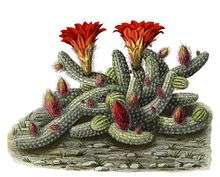Echinopsis chamaecereus
Echinopsis chamaecereus is a species of cactus from Argentina. Synonyms include Chamaecereus silvestrii and Lobivia silvestrii.[1] It has been called the "peanut cactus",[2] This plant should not be confused with Echinopsis silvestrii, another species with a very different appearance.[3]
| Echinopsis chamaecereus | |
|---|---|
 | |
| Scientific classification | |
| Kingdom: | Plantae |
| Clade: | Tracheophytes |
| Clade: | Angiosperms |
| Clade: | Eudicots |
| Order: | Caryophyllales |
| Family: | Cactaceae |
| Subfamily: | Cactoideae |
| Genus: | Echinopsis |
| Species: | E. chamaecereus |
| Binomial name | |
| Echinopsis chamaecereus H.Friedrich & Glaetzle[1] | |
| Synonyms[1] | |
| |
E. chamaecereus has long stems about 1 cm (0.4 in) across. Orange flowers up to 4 cm (1.6 in) wide appear in late spring. In cultivation, E. chamaecereus is hardy to temperatures as low as −7 °C (19 °F) if kept dry.[2]
This plant is a recipient of the Royal Horticultural Society's Award of Garden Merit.[4]
- Talcott Greenhouse
References
- Anderson, Edward F. (2001), The Cactus Family, Pentland, Oregon: Timber Press, ISBN 978-0-88192-498-5, p. 262
- Anderson, Miles (1999), Cacti and Succulents : Illustrated Encyclopedia, Oxford: Sebastian Kelly, ISBN 978-1-84081-253-4, p. 67
- Anderson 2001, p. 280.
- "Echinopsis chamaecereus". www.rhs.org. Royal Horticultural Society. Retrieved 5 June 2020.
This article is issued from Wikipedia. The text is licensed under Creative Commons - Attribution - Sharealike. Additional terms may apply for the media files.